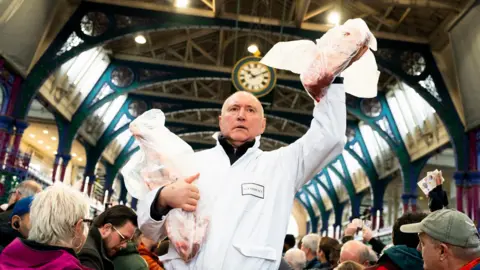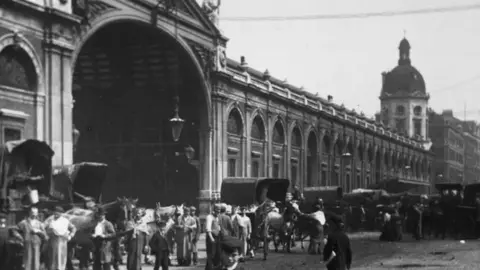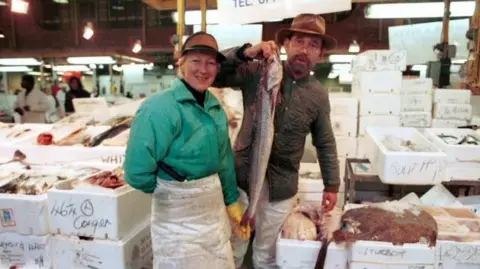 PA Media
PA MediaThe oldest meat and fish markets in London, which date back 850 years, are facing permanent closure from 2028.
Smithfield meat market, near St Paul’s Cathedral, and Billingsgate fish market in Canary Wharf are to be closed after the City of London Corporation voted to withdraw support for them.
The Corporation said it would now work with traders to help them find alternative premises.
Traders, who have been offered compensation, have said the move means a London tradition will be lost, with one saying “it’s all about the money now”.
 Getty Images
Getty ImagesSmithfield is the largest wholesale meat market in the UK and one of the biggest in Europe. The current iteration of the market has been trading at the site since the 1860s. Prior to that it was a livestock market, which dated back to the medieval period.
Work has already begun on turning this site into a new cultural and commercial hub, which includes the new London Museum.
Billingsgate is the largest inland fish market in the UK, with an average of 25,000 tonnes of fish and fish products sold there every year. The original market first traded in Lower Thames Street in the City in 1327, before moving to its current site in Poplar, east London, in 1982.
It provides fish to businesses including fishmongers, fish-and-chip shops, delicatessens and restaurants.
This site has now been earmarked to provide thousands of new homes.

Initially the Corporation had planned to move both markets as well as New Spitalfields in Leyton to a £1bn purpose-built site in Dagenham, however this was dropped earlier this month over cost concerns as the council had already spent £308m purchasing and remediating the site in Dagenham.
The decision to close the markets and offer traders compensation was made by the Corporation’s Court of Common Council.
The Corporation will now have to file a Private Bill in Parliament as it seeks to absolve itself of the legal responsibility of running the markets.
It said traders would be able to continue their operations at the markets until at least 2028.
‘Do my best’
Speaking to BBC London before the decision was announced, one trader – who did not want to give his name – said he had been forced to take the compensation offer or “leave with nothing”.
The trader, whose family has sold fish at the site for 70 years, added: “For what we’ve been offered to vacate the premises, I can’t go and reinstate myself somewhere else.
“I’ve been told to do my best with what I can do. It’s not great at all.”
On the wider impact, he said the closures would have a “massive knock-on effect”.
“It means there’s no fish market for London, which would mean the populace of London would have to resort to using local fishmongers which obviously isn’t the end of the world, but where are the fishmongers going to get their fish?
“London will be without a fish supplier, so there does need to be another fish market. When and how that’s going to happen I don’t know.”
Another trader said the demise of the market started when a decision was made to rid the fish porters of having to have a licence.
“For the younger guys down here it’s not good because no-one’s ever mentioned about the workers – they’re only ever interested in the companies,” he added.
Since then, Brexit and the pandemic have both brought down and led to the market’s demise, one trader told BBC London.
“It’s getting to the point where everything will be bought in a vac-pack,” another trader added.
‘Transition seamlessly’
Chris Hayward, policy chairman of the City of London Corporation, said the decision represented a “positive new chapter” for the markets as it “empowers traders to build a sustainable future in premises that align with their long-term business goals”.
He added: “By stepping back from direct market operations, we will help to create opportunities for these businesses to thrive independently.
“We’ve worked closely with the traders and thank them for their input and understanding.
“We’re committed to making sure they have the financial support and guidance they need to transition seamlessly and successfully to new locations.”
Dominic Twomey, leader of Barking and Dagenham Council, said although it was disappointing news, the council understood the “financial pressures that key investment projects” were facing.
He added they were committed to working with the Corporation to “unlock the huge potential” of the Dagenham Dock site.

